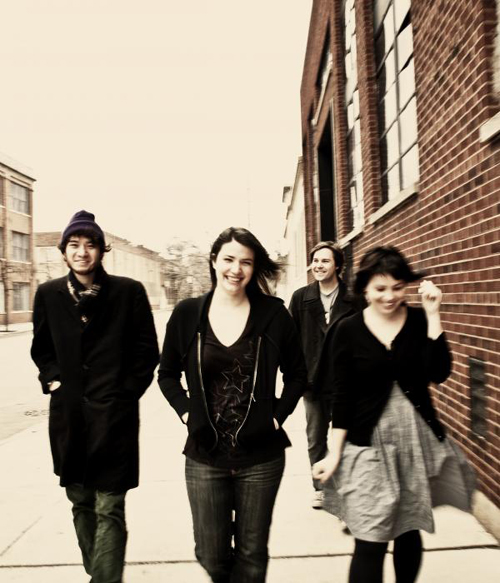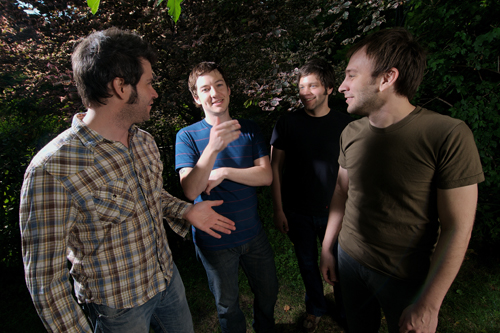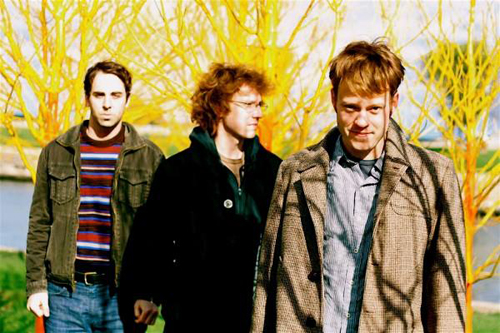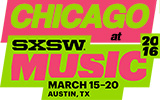| « This Sunday: The Legacy of Chess Records @ Blue Heaven Studios | Review: Them Crooked Vultures @ Aragon, 5/18/10 » |
Feature Thu May 20 2010
Homeless Together: Chicago's Blooming Shoegazer Scene
[Editor's note: This article was submitted by freelance writer Jon Graef.]
If one could close their eyes during Chicago-based dance-pop shoegazers Panda Riot's set at the Empty Bottle one late Sunday night in April, they'd swear that they heard the second coming. Not of the Stone Roses, or the King of Kings himself, but of a wave of British psychedelic music that saw its artistic zenith in the late 1980s and early '90s. Slowly, but surely, a shoegazer revival has come to dominate national critical discourse, with widely known groups like Serena-Maneesh, The Big Pink and A Place To Bury Strangers all recently releasing new material and playing Chicago shows. What isn't so known is that, based on a wealth of new material from several local up-and-comers, a revival of the aesthetic is occurring locally as well.
But it's not necessarily a scene, per se. In fact, many Chicago-based participants question the premise of a shoegazer revival in the first place. As they explain it, they simply aren't interested. Sitting in the Bottle's basement lounge before their show, Brian Cook, Panda Riot's guitarist makes a key distinction. "I mean, I'm definitely a fan of shoegaze and dreampop bands. I wouldn't say that I'm a fan of the genre. But I think traditional shoegaze is kind of...stagnant. Is that too negative?"
For a beat, Cook thinks about the answer to his own question before saying in a matter-of-fact, yet cautiously self-deprecating tone that "I think loud guitars and buried voice is just dead in the water. I mean, it is. [Laughs]."

Panda Riot
And yet, a quick look around the Chicago's music scene suggests otherwise. Panda Riot's rat-a-tat drum machine-enhanced rhythms and dub-driven bass lines help thicken up what is otherwise a rich, ethereal guitar sound that could exist in either 1991 or 2010. Clubs like The Burlington, Rodan and Beauty Bar have specific DJ nights devoted to spinning shoegazer and dreampop bands from the wave's original incarnation. Local bands like Apteka are opening up for more nationally known shoegazers like Serena Maneesh. And a dizzying array of groups in the Windy City, including Radar Eyes, Implodes, Sissy Mena and Coltrane Motion, have all released demos, EPs, digital singles and full-lengths that are simply remarkable. It's enough to get one excited about a shoegaze re-birth that just might be occurring in the city by the lake. So why do some of these participants bristle at the prospect of a Windy City revival?
Part of the reason just might be that being labeled as "shoegazer" band signifies that you're mining past musical territory for unoriginal effect — something that no artist or act aspires to do. As an inspiration for the right way to reference, but not duplicate, the shoegazer sound, Cook cites School of Seven Bells, a trio made up of former members from On! Air! Library! and Secret Machines. Bells blend gauzy guitar characteristics with dance-heavy rhythms and Eastern melodicism.
"[Their sound is] totally upfront vocals, dance-y, drum machine-based rhythms, [and] not a lot of guitar on the actual record. They're atypical if you compare them to any other band of the shoegaze, yet they have certain similarities [to past bands]. And that's the kind of music I'm a fan of."

Apteka
Luckily for Cook, Chicago is a place where bands can form their own sense of identity, even while throwing back to a well-worn musical style. For other potential luminaries, however, that sense of independence can be both a driving boon for artistic success and a hindrance to unity. Adam Lukas, frontman for Chicago quartet Apteka, recently described Chicago's music scene as being "independent to a fault" in an interview with music blog The Dumbing Down of America.
When asked to elaborate on that statement, Lukas explains that while Chicago bands are hard-working and ambitious, they can also be closed off from one another. "[Independence is] what gives [the Chicago music scenes] its strength, in some ways, but I think it can kind of ghettoize itself into certain scenes. I think everyone plays within the scenes, but I think that people can get themselves stuck. You can't really break out of it, and you're put into a boundary."
For Lukas, transcending that boundary means putting precedent on the band's live shows wanting to create "an event" by using "a big sort of wall-of-sound." As a band, Apteka's loud, psychedelic guitar sound recalls bands on the rock-heavy side of the shoegazer continuum. In other words, groups like Ride, Swervedriver and Loop. But Lukas says that the band's new material, which includes a recently released 7-inch, and another planned for this summer, showcases the band's aggressive use of rhythm even further. Despite these developments, a band that chooses to characterize their identity in some fashion risks isolation. As Lukas says, "you can just fall into niches as you get older, and I think that Chicago bands do that a lot."
Justin Cheng, Panda Riot's effortlessly laid-back, bearded bassist argues a similar point: "In Chicago, there are many coherent scenes, but because we don't have a genre, we're homeless. And other bands that don't have genres are also homeless. So we should all be homeless together."

Sissy Mena
But building that hypothetical home just might be easier said than done, especially for a subgenre known in part for withdrawn ambiance. Tyler Bringar, a member of local trio Sissy Mena, who combine the shredding guitar sound of proto-shoegazers like Dinosaur Jr. with a jangly pop sound, explained in an email that indie-rock "seemed more of a social scene than I was ever willing to participate in ... People want to gather and talk about indie rock and I don't begrudge them that, its momentum can be exciting."
In speaking of his musical background (growing up on a gravel-road farm in Iowa with "800 acres and no tall buildings"), Bringar explains that shoegaze was, and is, "isolation music." He writes, "Shoegazers want to get lost in strange sounds like they did all alone in their bedroom at 15. We'd like to reach out to similar bands and form a community but we're not really that social. I mean, we're shoegazers."
And yet, building the strong foundation for a new community of Chicago-based shoegazers is a project that could conceivably be done. Tirra Lirra is a band that consists of two percussionists and keyboardists, having been paired down from a trio. Like Panda Riot, Tirra Lirra takes the gauzy guitar reference points of shoegazers pasts and turns them on their head, adding mystical chants and sing-songy melodies on albums like last fall's superb Pink Live Forever. (Though the band's latest demos point to a more dance-pop centered sound). Tirra Lirra percussionist/keyboardist Brian Hank Henry says that bands need to be more adventurous by seeking out audiences that they aren't used to encountering.
"I think that a lot of people will just play shows with just their friends, and a lot of people feel like they can't get into that," Henry says. "You see a lot of the same bands play with each other all the time, but I think it's more fun to challenge yourselves to play to different crowds. What are you going to get if you play to the same people all the time? You get the same description as to how the show went, as opposed to inspiring people."
But while Henry emphasizes the value of bands challenging themselves to play with different groups of people — he cites a booking a show in June with local lo-fi experimental rock band Black Math as an example — Panda Riot's percussionist and vocalist Melissa Harris explains that a mixed crowd isn't all that it's cracked up to be: "I think the scene in Chicago could use definitely use more of a community base. It's large and it's disconnected. You end up playing with bands that aren't like you, so there's usually a mixed crowd usually at most shows, so it does feel a little bit like there's not a scene."
During Panda Riot's April set, it's easy to see why Harris doesn't necessarily feel community support. Rather than being a showcase of a scene that celebrates itself, the crowd seems tired (to be fair, this was Sunday night) and technical difficulties slightly mar the momentum of an otherwise enjoyable set. Yet, for whatever temporary live hiccups the band suffers, they demonstrate during the show that Far and Near is a strong showcase for the group's songwriting.
The EP is a compact 5-song effort that showcases the band's gift for matching breathy, singable melodies, courtesy of keyboardist/vocalist Rebecca Scott, with skittering, danceable drumbeats and ear-crushing guitar parts. The problem is whether or not artistic successes can result in a stronger artistic community, even though doing so seems like it would benefit everyone involved.
Which brings up a question that Brinegar concluded his email with, one that's undoubtedly food-for-thought: "...if bonds are failing to adhere in the loose and fuzzy world of dream rock, should we be too surprised?"
Perhaps not. By using the past not just as a final creative destination, however, but as a source of inspiration for a familiar, yet exciting and fresh, sound, don't be too surprised if those ties become stronger by the minute in the Chicago music community. And that's something that would make any Chicago music aficionado stand up and take notice.
Panda Riot's Far and Near is out now.
Apteka open for Spectrum of Spacemen 3 at Darkroom on May 20th.
Apteka, Panda Riot, Sissy Mena and James Cardis play June 10th at Subterranean.
This feature is supported in part by a Community News Matters grant from The Chicago Community Trust and the John S. and James L. Knight Foundation. More information.
— Jon Graef
















BG / May 20, 2010 1:44 PM
Great post! Love that Panda Riot!